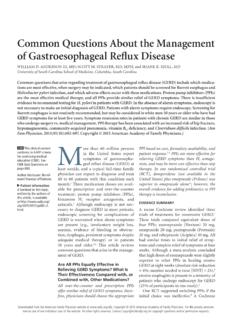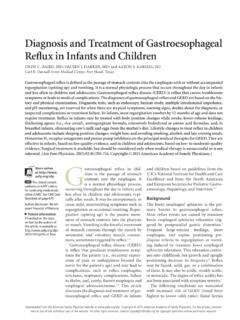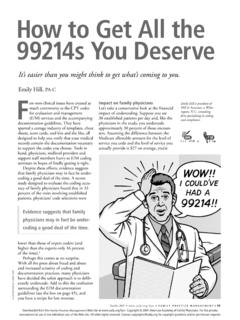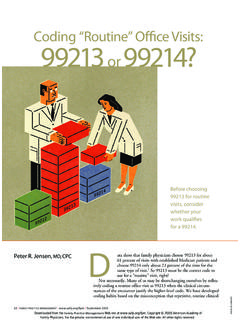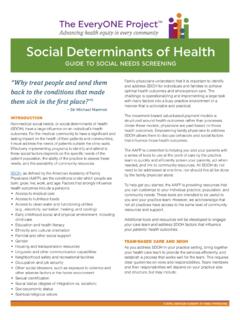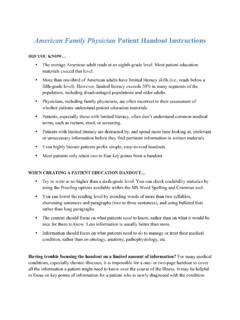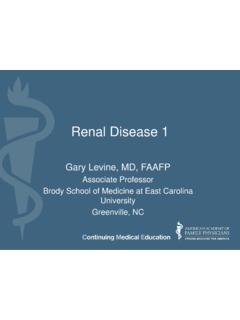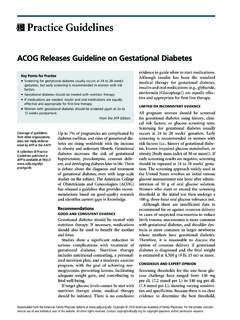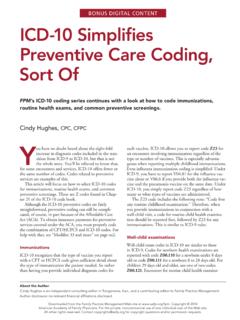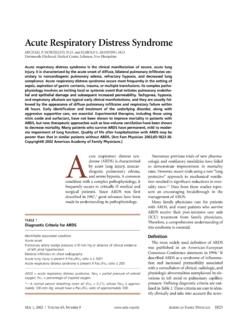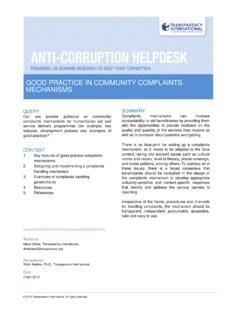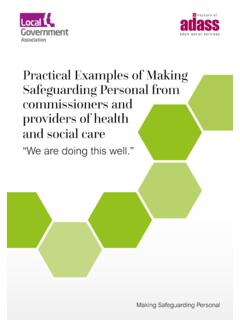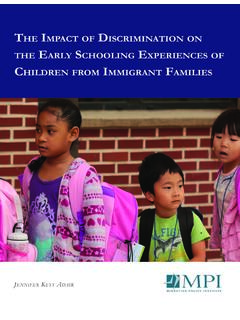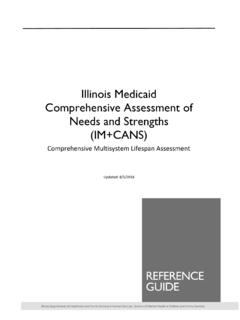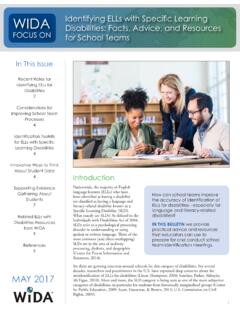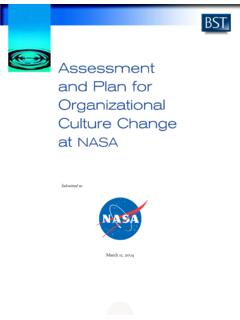Transcription of The Spiritual Assessment - American Academy of Family ...
1 The Spiritual Assessment AARON SAGUIL, MD, MPH, Fort Belvoir Community Hospital, Fort Belvoir, Virginia KAREN PHELPS, MD, Eisenhower Army Medical Center, Fort Gordon, Georgia More than 80 percent of Americans perceive religion as important. Issues of belief can affect the health care encounter, and patients may wish to discuss spirituality with their physician. Many physicians report barriers to broaching the subject of spirituality, including lack of time and experience, difficulty identifying patients who want to discuss spirituality, and the belief that addressing Spiritual concerns is not a physician's responsibility. Spiritual Assessment tools such as the FICA, the HOPE questions, and the Open Invite provide efficient means of elic- iting patients' thoughts on this topic. The Spiritual Assessment allows physicians to support patients by stressing empathetic listening, documenting Spiritual preferences for future visits, incorporating the precepts of patients' faith traditions into treatment plans, and encouraging patients to use the resources of their Spiritual traditions and communities for overall wellness.
2 Conducting the Spiritual Assessment also may help strengthen the physician-patient relation- ship and offer physicians opportunities for personal renewal, resiliency, and growth. (Am Fam Physician. 2012;86(6):546-550. Copyright 2012 American Academy of Family Physicians.). F. amily medicine promotes compre- regulations, and clinical practice guidelines. hensive care in a holistic context. Gallup polls indicate that 91 percent of As a result, Family physicians often adults believe in God or a universal spirit, broach a diverse array of topics dur- and that 81 percent consider religion impor- ing clinical encounters to assess patients' Research studies demonstrate that up perceptions of health and their ability to to 94 percent of hospitalized patients believe cope. Some of these topics include economic Spiritual health is as important as physical issues, Family systems, cultural and social health,4 that 40 percent of patients use faith determinants of wellness ( , community to cope with illness,5 and that 25 percent of of origin, immigrant status, occupation, patients use prayer for healing each education), and spirituality.
3 Similarly, other reports demonstrate that more than 80 percent of Family physicians Definitions identify themselves as Protestant, Catholic, The Merriam-Webster Dictionary defines or Jewish; that 79 percent identify them- Spiritual as of, relating to, consisting of, or selves as very or somewhat strong in their affecting the spirit or, alternatively, con- beliefs7; and that 78 percent feel somewhat or cerned with religious values. 1 Religion is extremely close to The Joint Commis- defined as a personal set or institutional- sion for Hospital Accreditation now requires ized system of religious attitudes, beliefs, a patient Spiritual Assessment upon hospital and practices. 2 Although persons who are Guidelines from the Institute religious may consider themselves Spiritual , for Clinical Systems Improvement state that there are many who consider themselves addressing spirituality may help in creating Spiritual but not religious. Because Family comprehensive treatment plans for those physicians care for patients of all affiliations, with chronic pain,10 and guidelines from the creeds, and beliefs, this article uses the term National Consensus Project for Quality Pal- spirituality because of its greater inclusivity.
4 Liative Care state that spirituality is a core component of palliative Scope of Spiritual Beliefs The perceived importance of spirituality by Patients and Physicians patients and physicians is borne out by secu- Given its pervasiveness, spirituality com- lar opinion polls, medical literature, hospital monly affects patient encounters. A study Downloaded from the American Family Physician Web site at Copyright 2012 American Academy of Family Physicians. For the private, noncommer- 546 American Family cial use of one Physician individual user of the Web site. All other rights reserved. Volume Contact for copyright 86, Number questions 6 September . and/or permission , 2012. Spiritual Assessment of 456 outpatients at six academic medical centers found that in the ambulatory setting, SORT: KEY RECOMMENDATIONS FOR PRACTICE. 33 percent wanted their physician to inquire Evidence about religious beliefs, and 19 percent Clinical recommendation rating References wanted their physician to pray with If dying, 70 percent would want their physician Patients should have a Spiritual Assessment C 9.
5 Upon admission to the hospital. to know their beliefs, and 50 percent would addressing spirituality may help when C 10. want their physician to pray with A forming a comprehensive treatment study performed at hospitals in North Caro- program for patients with chronic pain. lina and Pennsylvania demonstrated that 77 Spirituality should be addressed as one of the C 11. percent of Family medicine inpatients felt core components of quality palliative care. that physicians should consider their spiri- tual needs, and 48 percent wanted their phy- A = consistent, good-quality patient-oriented evidence; B = inconsistent or limited- quality patient-oriented evidence; C = consensus, disease-oriented evidence, usual sician to pray with them. Despite this, most 4. practice, expert opinion, or case series. For information about the SORT evidence ambulatory and hospitalized patients report rating system, go to that their physician never discussed beliefs with them,4,13 even though 85 to 90 percent of physicians felt they should be aware of patient spiri- a Spiritual conversation is most easily introduced when tual ,15 patients bring up concerns and crises without prompting.
6 When asked to identify barriers to the Spiritual assess- ment, physicians pointed to a lack of time (71 percent), Conducting the Spiritual Assessment lack of experience taking Spiritual histories (59 percent), Before conducting a Spiritual Assessment , physicians difficulty identifying patients who wanted to discuss should consider their personal faith tradition, beliefs Spiritual issues (56 percent), and the belief that address- and practices, positive and negative experiences, atti- ing Spiritual concerns is not part of the physician's role tudes on faith and healing, and comfort and ability to (31 percent).16 To address these objections, there are tools participate in another's spirituality or share their own. and training programs available to improve physicians' Some physicians may not consider themselves Spiritual , efficiency in raising Spiritual ,18 Additionally, may not wish to discuss spirituality, or may vary in their there is literature indicating which patients including level of ease or capability in discussing Spiritual con- those who are hospitalized or terminally ill are more cerns.
7 Rather than a coercive responsibility, conducting likely to welcome a Spiritual ,12 With respect a Spiritual Assessment and offering Spiritual support are to the relevance of spirituality, there is research pur- similar to eliciting a social history and empathizing after porting beneficial links between spirituality and a host the delivery of a negative diagnosis. They provide yet of conditions, including cardiovascular disease, cancer, another way to understand and support patients in their depression, adolescent risk behaviors, anxiety, pain, experience of health and illness. poor self-reported health, and Several tools exist to help physicians conduct a spiri- tual history. The FICA Spiritual History Tool (Table 130). Whom and When to Assess uses an acronym to guide health professionals through Older patients, hospitalized patients, and patients with a series of questions designed to elicit patient Spiritual - terminal illness often wish to share their beliefs, to hear ity and its potential effect on health care.
8 Starting with those of their physician, and to have their physician pray queries about faith and belief, it proceeds to ask about for or with ,12,29 Physicians may consider conduct- their importance to the patient, the patient's commu- ing a Spiritual Assessment with patients who fall into nity of faith, and how the patient wishes the physician to these groups, or with other established or new patients. address spirituality in his or her care. In addition, physicians may wish to assess patients who The HOPE questions are another tool (Table 2).31 These face existential crises, such as those in whom a chronic questions lead the physician from general concepts to disease has been diagnosed, those with worsening ill- specific applications by asking about patients' sources of ness, or those with new or persistent mental health dis- hope and meaning, whether they belong to an organized ease. Finally, physicians may consider the casual remarks religion, their personal spirituality and practices, and that patients sometimes make about their faith or spiri- what effect their spirituality may have on medical care tual practices as cues inviting discussion.
9 In some cases, and end-of-life decisions. September 15, 2012 Volume 86, Number 6 American Family Physician 547. Spiritual Assessment A third tool, the Open Invite, is a patient-focused tual practices generally is beyond the proper bounds of approach to encouraging a Spiritual dialogue. It is struc- the physician-patient relationship. Second, Open Invite tured to allow patients who are Spiritual to speak fur- provides a mnemonic for the general types of ques- ther, and to allow those who are not to easily opt out. tions a physician may use (Table 3). The tool provides First, it reminds physicians that their role is to open the questions that allow the physician to broach the topic door to conversation and invite (never require) patients of spirituality. Questions may be similar to those used to discuss their needs. Preaching or prescribing spiri- in the FICA and HOPE mnemonics, or may be custom- ized. Examples include, May I ask your faith background? or Do you have a Spiritual or Table 1.
10 FICA Spiritual History Tool faith preference? The invite questions are used to encourage patients to discuss their Category Sample questions needs as their comfort allows. Sample ques- tions include, Does your spirituality impact Faith and Do you have Spiritual beliefs that help you cope with stress? the health decisions you make? or Is there belief If the patient responds no, consider asking: what gives your life meaning? a way in which you would like for me to Importance Have your beliefs influenced how you take care of yourself account for your spirituality in your health in this illness? care? The key to this approach is to use Community Are you part of a Spiritual or religious community? questions that are natural and conversational Is this of support to you, and how? while being respectful and nonthreatening. Address in How would you like me to address these issues in your care health care? Incorporation of Spiritual Needs into Patient Care Adapted with permission from The George Washington Institute for Spirituality and After Spiritual needs have been identified, Health.
